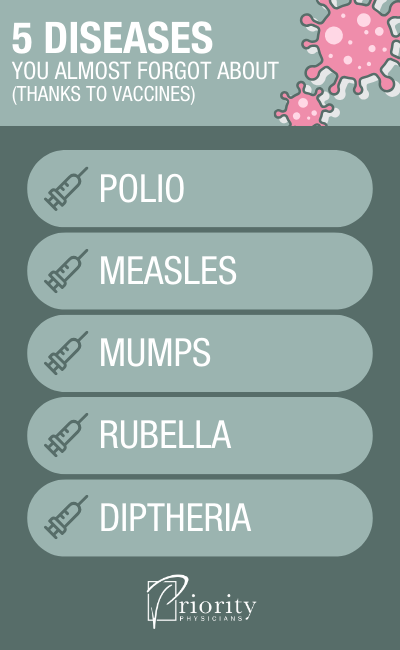Vaccines are often misunderstood because they’re victims of their own success.
Baby Boomers recall times when many diseases caused by pathogens — measles, rubella, mumps, smallpox, even polio — were still prevalent. But Gen X and Millennial adults (even those of us who went to medical school) have no memory of the damage unchecked infectious diseases do.
The result: Today, some people question how necessary or effective vaccines are.
But the truth is, vaccines really work.
The CDC tells us that four million deaths are prevented by childhood inoculations each year. In fact, a number of the viruses that caused those illnesses when Boomers were young have all but disappeared, thanks to vaccines.

How Safe Are Vaccines?
Today’s FDA-sanctioned vaccines are exceedingly safe, especially those that have done their job for 40-plus years.
When medical scientists develop a vaccine, their sole aim is to quickly suppress the viral invader by delivering a beneficial solution to the public. Working in a lab setting, they generate a weakened or dead form of the virus.
You receive a tiny dose of that weakened or dead virus in your inoculation. Your body reacts by building immunity against the virus. If or when you encounter the bug again, your body recognizes it and is prepared to fight it.
Vaccines are monitored continuously for safety. It’s riskier to contract a particular virus than to receive a vaccine that may have a slight side effect. Like any medication, the injection may cause mild symptoms — perhaps a slight fever, or redness at the injection site — which disappear on their own within a few days. Serious side effects are very rare.
As a medical professional, I’m so confident that the benefits outweigh any small risk that I ensure my own children are fully vaccinated.
Conquering Mistrust
In recent years, people’s trust in vaccines has suffered. The media has played an unfortunate role in sowing doubt by giving airtime to misinformed celebrities like Jenny McCarthy, who stoked fear and mistrust of the measles vaccine. Science has found no evidence of a link between vaccines and autism (or any other disorder) in children.
Then the COVID-19 pandemic arrived. When inoculations became available to treat the coronavirus, the situation became political. Many people trusted incorrect information without considering the source.
Yet, even in the face of so much misinformation, the majority of us chose to be inoculated, and COVID vaccines proved effective against the virus.

The Dangers of Doubting Vaccines
While it’s true that many viruses from long ago are all but eradicated, that doesn’t mean they can’t resurface. In fact, in some areas, measles is starting to recur in children.
Why is this happening?
The world got complacent. Measles awareness and surveillance declined. Fewer people get inoculated, either because they’ve forgotten the danger or because they mistrust vaccines in general.
And if more and more people go unvaccinated, the original bug can mutate, rendering current vaccines ineffective and putting previously vaccinated people at risk.
If measles makes a comeback, it will spread. We’ll see a fresh epidemic, with kids particularly susceptible.
Let’s Talk
As parents, we all want to keep our kids safe. Every caring parent does the best they can with what they have. Perhaps the most important thing you can do for you and your children’s health is to stay informed about vaccines.
At Priority Physicians, we’re passionate about the safety and efficacy of regular vaccinations. If you routinely avoid vaccines and feel uncertain about their risks and benefits, but you’re open to a conversation about them, we’re happy to talk. Let us help you feel more secure about today’s vaccines and what they can do.
Vaccines have saved more lives than anything else medicine has to offer — and vaccination is the single best thing we offer for the health of you and your family. You can trust us on this.

